La Vía Campesina International Seminar discusses sexual and gender diversity
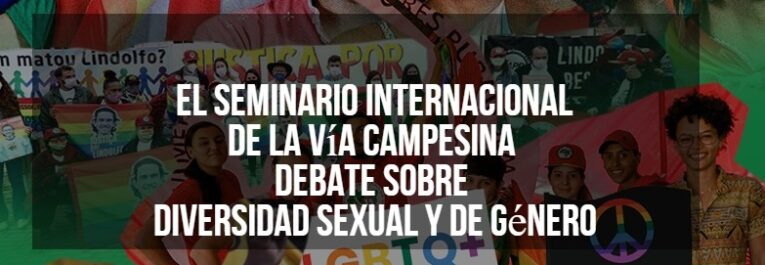
Debates highlighted the importance of sexual and gender diversity in the different cultures and social contexts of the organisations on five continents
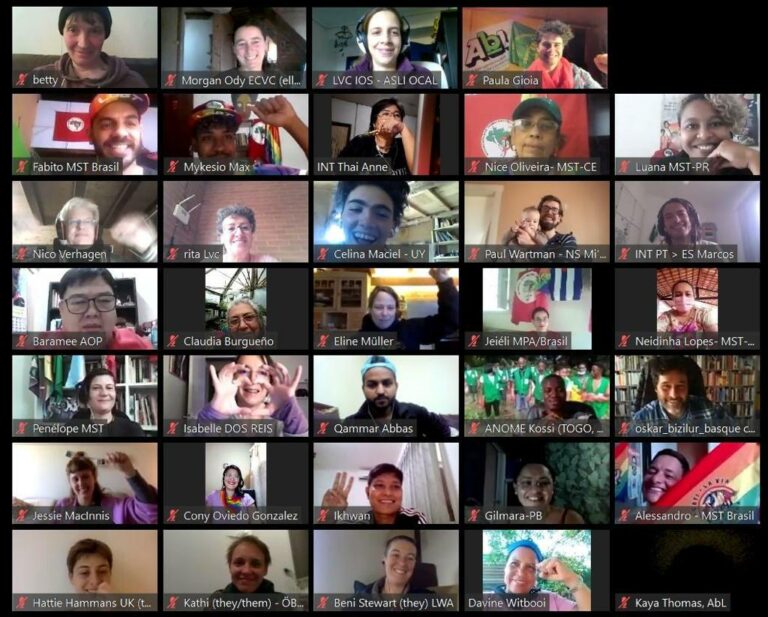
Seminar participants from several grassroots movements that are part of La Vía Campesina on five continents. Photo: Vía Campesina Brazil
By Solange Engelmann
From the MST webpage
With more than a hundred participants, representing grassroots peasant organisations from five continents, La Vía Campesina held the International Training Seminar on Sexual and Gender Diversity on Tuesday 14th December, online.
“My manliness is accepting that I am different, because to be a coward is to be much tougher…So many children will be born with broken wings and I want them to fly…We are women, we are frontiers…we are lesbians…we are strength, we do not walk alone… we are LGBTI+, we are strength, we do not walk alone….We are LGBTI+, we are strength, we do not walk alone”, announced the mística. It was led by members of MST’s LGBT Collective, denouncing discrimination against Lesbian, Gay, Bisexual, Transgender and Intersex (LGBTI+) peasants and highlighting the importance of the struggle for inclusion and the visibility of sexual and gender diversity in organisations making up Vía Campesina and in society.
With the goal of broadening the debates, learning and exchanging of experiences on the rights of LGBTI+ people and sexual diversity, the seminar was attended by activists and leaders of various peasant movements, who discussed their cultural, sexual and gender differences in each social and historical context.
The activity was split into two parts: first, leaders of La Vía Campesina organisations led general debates on the day’s topic and discussed how these grassroots movements have approached it. Then, regions held a debate on courses of action to be pursued.
Opening the discussions, Jaime Amorim, a representative of La Vía Campesina and an MST leader in Pernambuco, said that grassroots movements are currently having a difficult time on several continents, such as in Brazil, with governments spreading a policy of hate and discrimination against LGBTI+ people, women and gender diversity. Therefore, the struggle for the rights and visibility of LGBT+ issues is essential.
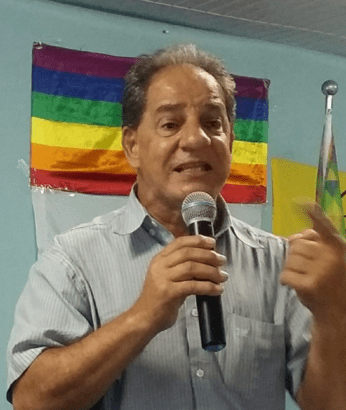
Jaime Amorim, representative of La Vía Campesina and MST leader. Photo: personal archive
“We are going backwards politically – governments are encouraging prejudice against young people, black people, Indians, women and LGBTI+ people. But it is also time to redo and rethink these struggles based on the quest for inclusion and the respect of all identities in society,” he said.
According to Amorim, some La Vía Campesina organisations on a few continents still face several obstacles concerning debate and the rights of the LGBTI+ population. In some African countries, people’s lives are even at risk. In this context, he pointed out that La Vía Campesina’s main challenge is to help boost the organisation of collectives promoting the visibility of sexual diversity and various identities.
“It is through our differences that we will build the collective ‘us’ and our identities, reasserting the political strength of our organisations. It is time to organise and make identities visible within our organisations and in society. We want to increase the visibility of gender and sexual diversity by including it in the statutes of La Vía Campesina. Our main task is to demonstrate that we have the strength to build the LGBTI+ Collective in all the organisations and continents making up La Vía Campesina.”
Alessandro Mariano is from the National Directorate of the MST and a member of the already two-year old LGBTI+ Collective of Vía Campesina Brazil. He explains that this year LGBTI+ articulation is being strengthened within LVC South America and the Latin American Coordination of Rural Organizations (CLOC), in which Paraguay, Argentina, Uruguay, Ecuador, Colombia and Nicaragua participate.
“We are in the process of reasserting our existence as rural LGBTI+ people as a part of peasant struggles and resistance, affirming LGBTI+ as a political identity, no longer being invisible, but also making it clear that the countryside is our place to be, exist and love without fear,” she said.
Sexual diversity and gender identity
Mariano also explained that the concept of sexual diversity and gender identity states that human beings, besides being culturally, linguistically and religiously diverse, are also diverse in terms of sexuality and social identity.
“We are diverse in our human gender, because it is possible to be male or female; but also transgender and non-binary. We are nature, but we are social beings; we have an intellect. And what we understand to be a man or a woman is a social and historical construct, it is not fixed.”
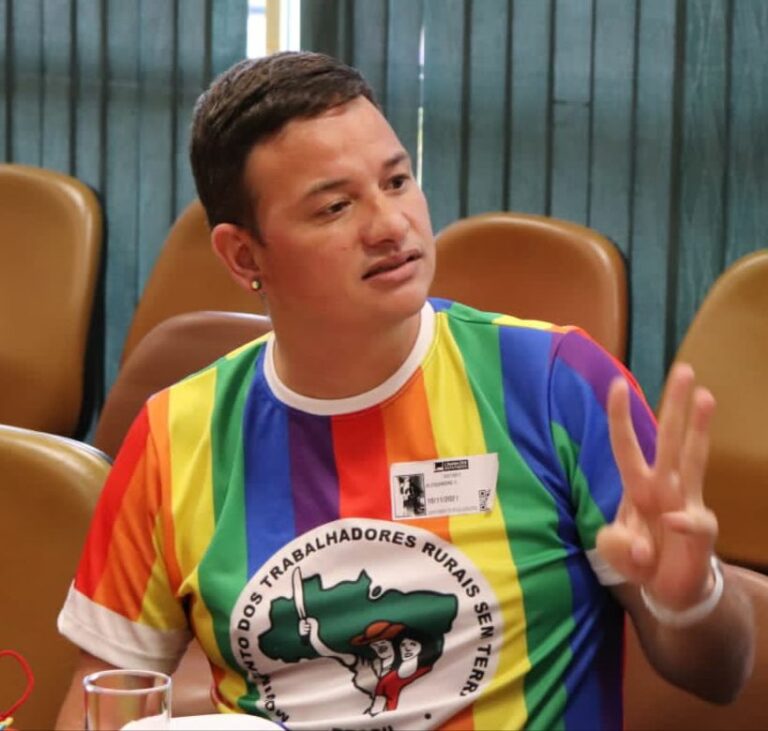
Alessandro Mariano, from the National Directorate of the MST and the LGBTI+ Collective of Vía Campesina Brazil. Photo: personal archive
Regarding gender identity, Mariano stresses that it is a process of self-definition, in which each person recognizes themself and wishes to be socially recognized, regardless of their biological sex, and may identify as female, male, or even as a combination of the two or not see themselves in either of these possibilities.
“One of the gender identities is that of transsexual, men or women who have a gender identity different from the one given to them at birth by their biological gender and who wish to live, be accepted, and recognised for who they are.”
Therefore, for people to live and love freely in the countryside, working the land and producing healthy food, as well as overcoming all forms of violence including LGBTIphobia, sexism, racism and the like, grassroots movements need to advance in these debates and struggles, says Mariano.
“Our organisations and struggles need to enable LGBTI+ people and the diverse bodies and sexualities of peasants to have the right to life, love and happiness. We need to include all types of diversity in the rural project, in food sovereignty, and in the struggle for the liberation of peasants that we stand for,” he concludes.
The African Continent
Davine Witbooi, from the Landless Peoples’ Movement (LPM) of South Africa, also participated in the seminar. She explained that the debate on sexual diversity in Africa is currently facing many barriers, as non-heterosexual gender norms have been silenced. This was not the case before colonisation, since sexual diversity was a part of cultures.
“In Africa, before colonisation, sexual diversity was respected – having more than one partner was normal and to be expected. Today people don’t accept it. For example, in Uganda the penalty for anyone caught committing a sexual offence is prison. And in East African countries, being LGBTI is prohibited and can get you life imprisonment,” she says.
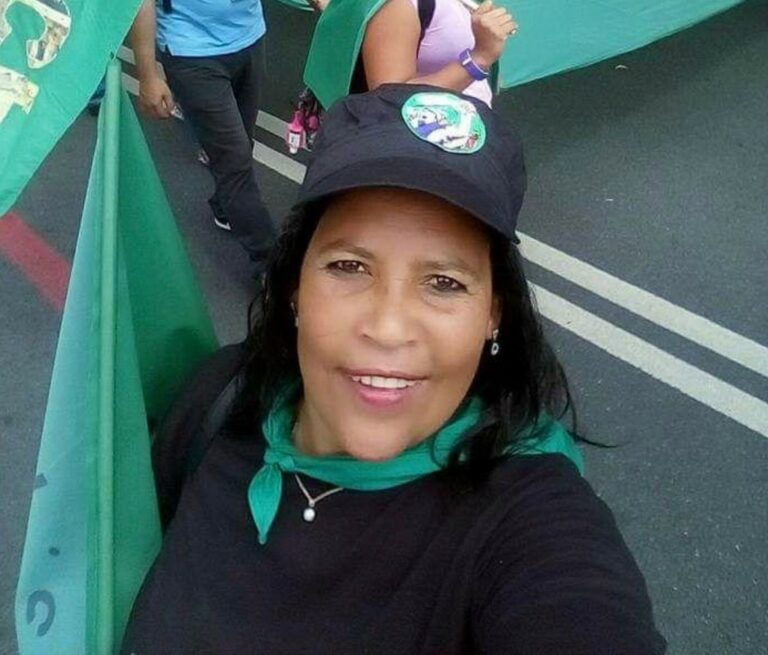
Davine Witbooi, from the Landless Peoples’ Movement (LPM) of South Africa. Photo: personal archive
This is why Davine considers it essential that La Vía Campesina broadens the debate of the LGBTI+ Collective among organisations on the African continent.
“We need more allies to uphold LGBTI+ rights in this region. Include this discussion in the general debate of La Vía Campesina. Open the discussion and have a safe space within our movement and in the global context of La Vía. People with different sexual identities are human and need to be respected.”
The situation is no different in the Congo, where Albert Bahana says that even with the organised LGBTI+ collective, there is still a lot of discrimination. In this sense, he points out the need for La Vía Campesina to start more campaigns to contribute to the fight against discrimination and to the struggle for sexual and gender diversity on the African continent.
The Asian Continent
Nikar Yen-ling Tsai from Yilan, Taiwan, is a 46-year-old cisgender, bisexual woman and a member of Landdyke Feminist Farm. This gender non-binary farm was founded in 2012 with the aim of serving as a model, providing women with skills and the strength to become environmentally-friendly farmers. On this farm lesbian women produce rice, apples, persimmons and citrus fruits.
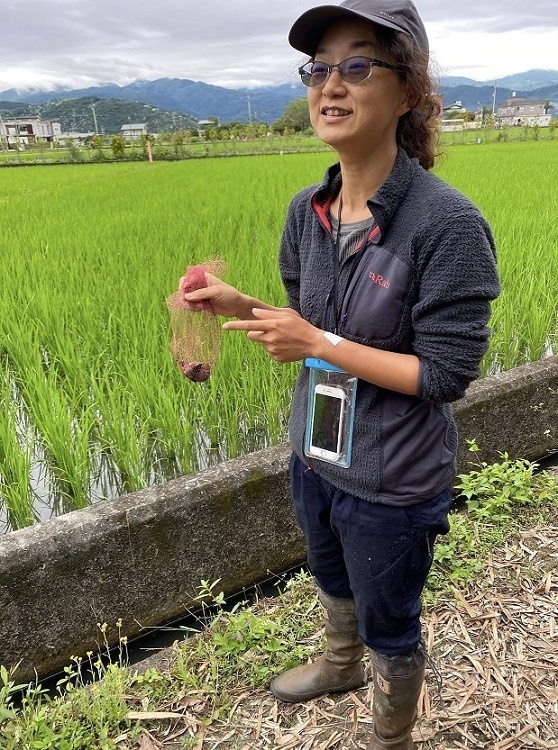
Nikar Yen-ling Tsai from Landdyke Feminist Farm in Taiwan. Photo: personal archive
Nikar noted that the farm was started by five amazing women farmers, the co-founders. As a result, visibility and respect for lesbian women farmers has improved in Taiwan, as they foster sexual and gender diversity and biodiversity at the same time. She believes that non-binary thinking is the way forward, and “family farming should certainly be the backbone of agriculture, especially since the growth of agriculture’s profit rate in recent decades has brought monoculture and unemployment to the global countryside. However, it is equally important to critique what we mean by ‘family farming’ and its potential to exclude and marginalise people of a non-binary gender and those who break with the patriarchal model of the family.”
In her opinion, gender non-binary existence can help us think creatively about crises, forge more unlikely alliances, and “perhaps in doing so we can bring about more inclusive agriculture and socio-economic systems.”
Nikar highlights the importance of La Vía Campesina always being at the forefront of this change, making it possible to believe that another world is indeed possible, one with LGBTI+ inclusion.
Women’s participation and gender equality
Sônia Vidal from the Galician Farmers Union, which is also part of La Vía Campesina, spoke about the history of women’s coordination and the gender equality debate in LVC.
“In 1992, when La Vía Campesina began, there was no participation of women. The Women’s Commission was established in 1996 at the second conference. In 2000, the first Women’s Assembly was held, which, while based on food sovereignty, included the debate on gender equality and equal rights. In 2008, the No More Violence Against Women Campaign was officially launched, a commitment that has continued building new human relationships”, she said.
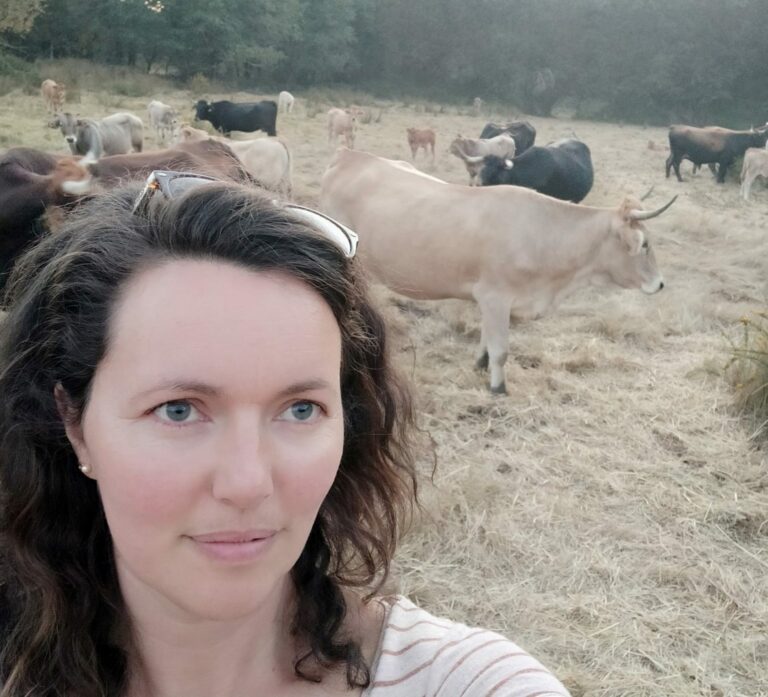
Sônia Vidal of the Galician Farmers Union. Photo: personal archive
She also commented on integrating the LGBTI+ debate, which has been moving forward in the organisation.
“In 2007, the construction of new gender spaces was defined, for gay people, lesbians; the patriarchal system we live in affects everyone. To move forward we need to be feminists. The challenge of achieving food sovereignty involves the fight for gender equality, and the construction of new human and gender relations within the Vía Campesina,” she says.
Lidiane and Jeiéli, activists from the Movement of People Affected by Mining (MAM) and the Movement of Small Farmers (MPA) of Rondonia respectively, agreed on the importance of the LGBTI+ debate within La Vía Campesina, as a factor that contributes to the visibility and internalising of these rights and to the fight against sexual and gender discrimination, everywhere.
“In terms of the impact that mining has on our lives, we suffer a lot of prejudice, it’s all very homophobic. Besides people being impacted by mining operations, the residents are involved too. We are trying to work on these issues, especially via education, in these areas where the patriarchy is still very strong,” says Lidiane.
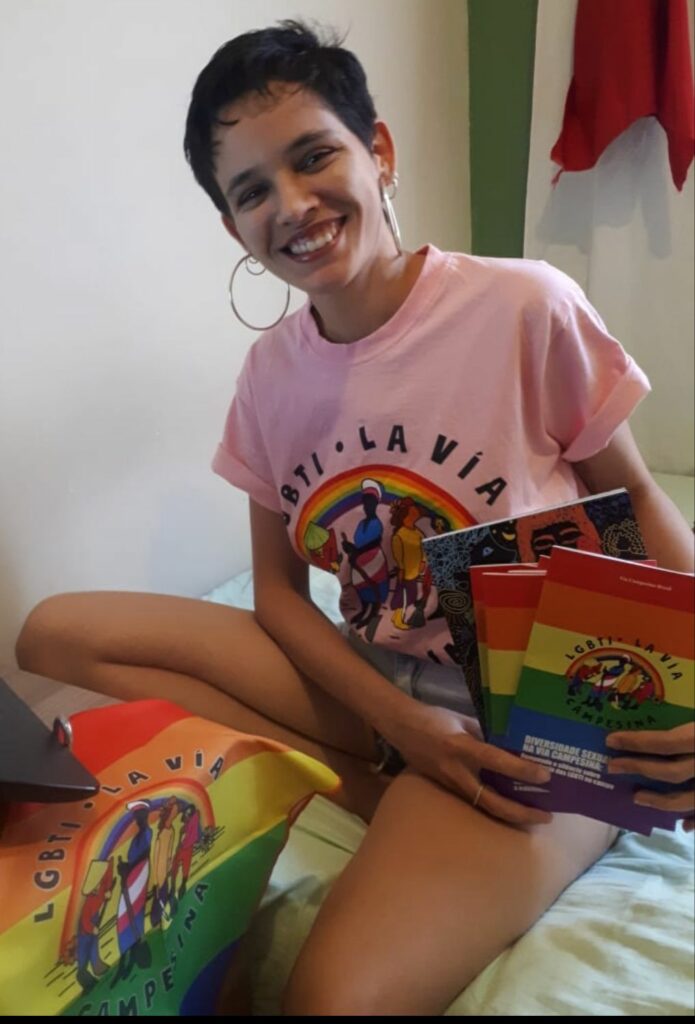
Jeiéli from the MPA. Photo: personal archive
“I am bisexual and I needed to leave my community to try to develop my identity, due to the stigma there. Having this space is very important within the organisations in order to confront the patriarchal practice that exists within capitalism. Just the fact that we exist is already a form of resistance”, said Jeiéli.
Next steps
Morgan Ody is a small-scale vegetable farmer from Brittany, France, and General Coordinator of La Vía Campesina International. In her speech at the end of the seminar, she said that from now on it will be up to La Vía Campesina to support the organisations’ processes. They will need to work towards sexual and gender diversity articulation within LVC, strengthening the agenda wherever possible, with the support of women and youth organisations.
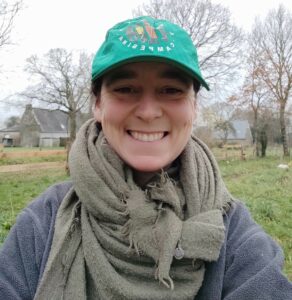
Morgan Ody from France, General Coordinator of La Vía Campesina International. Photo: personal archive
Ody recognises that the task may not be easy, but she sees the need for meetings to be held in all regions and continents, with the goal of including this debate in the 8th International Conference of La Vía Campesina, to be held in Nicaragua in 2023.
*Edited by Fernanda Alcântara
This post is also available in Español.
